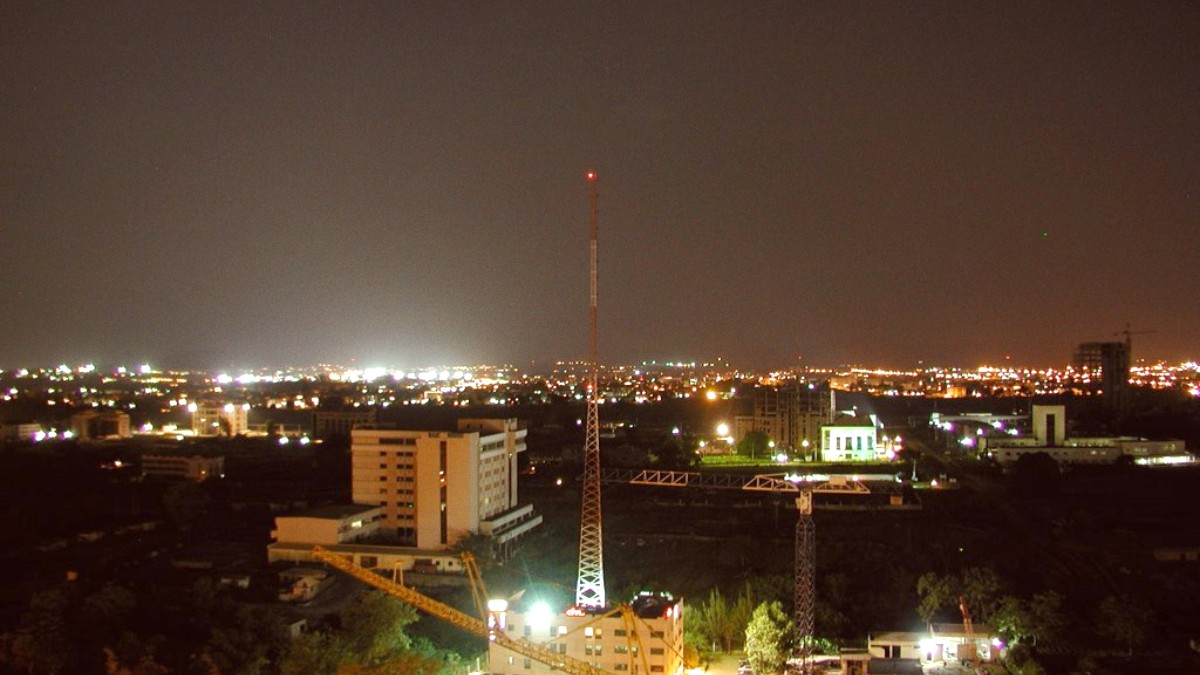
Nigeria
Abuja, a planned city, features prominent modern landmarks reflecting Nigeria's national narrative.
These sites offer architectural grandeur and symbolic importance within the Federal Capital Territory.
Be mindful of local customs and privacy when taking photos.
Abuja City Gate, a prominent entry point, symbolic monument. National Cenotaph, a war memorial for fallen Nigerian soldiers.
National Mosque and National Christian Centre are main national religious symbols and major architectural landmarks.
The city's design itself represents a modern historical ambition: the creation of an unified, purpose-built capital.
Abuja is a relatively new, planned city, without ancient archaeological sites or ruins within its direct vicinity.
Abuja not mainly a center for industrial or military heritage tourism. These aspects are not tourist attractions within the capital.
Abuja integrates green spaces and natural features into its urban fabric, creating pleasant escapes.
Millennium Park: Large, well-maintained park for relaxation, walks, and picnics. National Children's Park and Zoo: A smaller park with a modest zoo, mainly geared towards children. Jabi Lake Park: The park area surrounding Jabi Lake, pleasant views and recreational opportunities.
Aso Rock: Panoramic city views (if access granted), admired from surrounding viewpoints. Zuma Rock: Located just outside Abuja (in Niger State), a massive monolithic inselberg visible when approaching the city from the north. It a striking natural wonder and a popular photo stop.
Jabi Lake: The only significant lake within Abuja activities for recreational activities like boating. The city is inland and does not have beaches.
National Children's Park and Zoo: limited wildlife viewing. Abuja does not have major wildlife reserves or safari parks directly within its vicinity.
For extensive wildlife experiences, you would need to travel to other regions of Nigeria.
Aso Rock and Zuma Rock: These are the most significant geological features in and around Abuja, defining the landscape with their imposing presence.
Beyond well-known landmarks, Abuja quieter spots that present a local experience.
A collection of traditional-style huts selling Nigerian crafts, artworks, and souvenirs. It a different feel from modern malls.
For authentic Nigerian food, seek out the bustling local "buka" restaurants. These informal eateries a true, authentic local experience.
New areas developing and unique angles for capturing Abuja's spirit.
Utilize these resources to plan and enhance your sightseeing and attraction visits in Abuja.
GetYourGuide: Online platform for booking attraction tickets and tours.
Engaging a local guide further exploration and uncovers insights into the city's culture and history.
Consult recent travel blogs for the latest openings and experiences. Always verify current operating hours and any temporary closures before visiting.
When visiting religious sites, always dress modestly and show respect for local customs and practices.
Remain aware of your surroundings, especially in crowded markets or less familiar areas. Exercise caution after dark.
Plan your routes to attractions, especially during peak traffic hours, using ride-hailing apps for reliability.
Engaging with locals can enrich your experience; friendly greetings and genuine interest are always appreciated.
Abuja can be hot. Carry water, especially when exploring outdoor attractions like parks or markets, to stay hydrated.
The largest public park in Abuja, designed by Manfredi Nicoletti. It features a river flowing through its center, extensive walking paths, gardens, and fountains. It a popular spot for relaxation and recreation.
A natural lake situated within the city, Jabi Lake a pleasant recreational area. The lake activities for boat rides, jet ski rentals, and paddleboarding. A park area surrounds parts of the lake, and the modern Jabi Lake Mall is conveniently adjacent.
Allow time in your itinerary for spontaneous exploration, specifically in markets or local eateries.
This approach can lead to discovering your own hidden gems and truly local interactions.
General advice for navigating and enjoying your visit to Abuja.
The local currency is the Nigerian Naira (NGN). Major credit cards (Visa, MasterCard) are accepted at upscale hotels, large restaurants, and malls. However, cash is king for local markets, street food, and smaller establishments.
Mobile network coverage is generally good in Abuja. Purchasing a local SIM card (MTN, Glo, Airtel, 9mobile) upon arrival a cost-effective way to stay connected. Wi-Fi widely available in hotels and many restaurants.
Consult your doctor before travel for vaccinations (yellow fever often a requirement). Drink bottled water only. Exercise caution in crowded areas. Avoid walking alone at night in poorly lit areas. For emergencies, contact local police or your embassy.
Local emergency numbers are 112 (general) and 0803 123 0631 (police control room).
Ride-hailing apps (Uber, Bolt) are the safest and most reliable way to travel within Abuja. Taxis are available but agree on the fare beforehand. Public mini-buses (Keke Napep, Okada) are riskier options due to safety concerns and road conditions.
Avoid walking long distances, especially at night.
Nigerians are generally friendly and hospitable. Politeness and respect for elders are highly valued. Dress conservatively, especially in public and religious places. Photography of government buildings is often prohibited or discouraged.
Be open to conversation; Nigerians are often curious and welcoming.
Dry season (November to March) for pleasant weather, though dusty harmattan winds occur. Wet season (April to October) greener, but with heavy rainfall.
Most foreign nationals need a visa for Nigeria. Check requirements well in advance with the Nigerian embassy in your country. E-visa and Visa on Arrival options exist for some nationalities.
Consider hiring a local guide for insights and easier navigation, especially for cultural experiences or market visits.